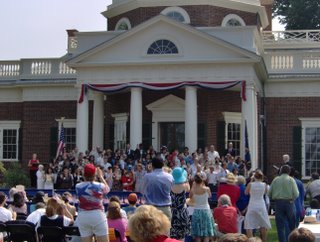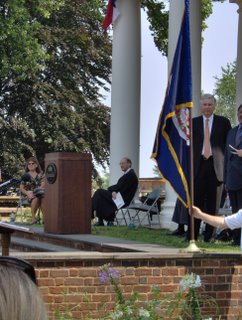From the Archives: Actress Tracey Ullman reflects on citizenship and equality at Monticello
Actress Tracey Ullman reflects on citizenship and equality at Monticello
July 4, 2010 4:28 PM MST
 |
| Tracey Ullman at Monticello, July 4, 2010 |
Ullman is a dual British-American citizen. Born and raised in Slough, England, she has lived and worked in the United States for 25 years and became a naturalized U.S. citizen in 2006.
In her remarks to the 71 immigrants from more than two dozen countries (from Afghanistan and Armenia to Uzbekistan and Vietnam), Ullman emphasized how her early impressions of America were those of “confidence,” that the American attitude was one of “if you want it, come and get it.”
After the ceremony, Ullman sat down for a one-on-one interview with the Charlottesville Libertarian Examiner, answering questions about citizenship, the American dream, and what she finds valuable in the American founding.
Subjects and Citizens
Noting that it was recently revealed that, in his draft of the Declaration of Independence, Thomas Jefferson wrote the word “subjects” and smudged it out so he could replace it with “citizens,” Ullman talked about the difference between “subject” and “citizen,” because she has been both.
She said she was pleased to learn about Jefferson’s editing, that “he changed it, that he moved on, that he made the change.”
“Yes,” she said, “I have been a subject and now a citizen and it’s interesting. I just think that we are equal. There’s no one better than us. We’re not paying people millions of pounds to be better than us,” as the British pay their royal family.
“I’ve never been a royalist,” Ullman explained, “and that [equality] is something that really appealed to me about America.”
Image of Confidence
When she was growing up as a girl in England, Ullman absorbed many images of America that she saw on television. What most impressed her, she said, “was the Olympics,” not only because American athletes won so many gold medals, but “it was the confidence,” they exhibited.
In addition, she said, “it was that ‘you can be anyone you want to be’” attitude and “kindness,” as well as “inspirational people like Lily Tomlin. I impersonated her at my school when I was like 10. I said, ‘I want to be Lily Tomlin. I want to be Gilda Radner.’”
Ullman joked that “our images of America were like Dallas, when I was a kid, like soap operas and things” but even so, when she first arrived in the United States at the age of 20, she was “very inspired.”
Citizenship Test
Since Ullman so recently went through the naturalization process, she spoke about the most surprising things she learned as she prepared for the citizenship test.
One was, she laughed, a question about two forms used by the immigration authorities, the N-200 and the N-400. That’s “a real question,” she said, and applicants had to know the difference between those forms. “I think they’ve dropped that one now, it’s a little obscure.”
She was most impressed, however, by the Bill of Rights and the Declaration of Independence, which is why, she said, it is so inspiring “to be here, where Thomas Jefferson” lived. He was “so forward thinking,” for his time, Ullman remarked, and that is why she remembers “really being impressed with the words of the Founding Fathers, in particular Thomas Jefferson, who was just so enlightened and so brave and so incredible at that time and still holds up” today.
Publisher's note: This article was originally published on Examiner.com on July 4, 2010. The Examiner.com publishing platform was discontinued July 1, 2016, and its web site went dark on or about July 10, 2016. I am republishing this piece in an effort to preserve it and all my other contributions to Examiner.com since April 6, 2010. It is reposted here without most of the internal links that were in the original.








